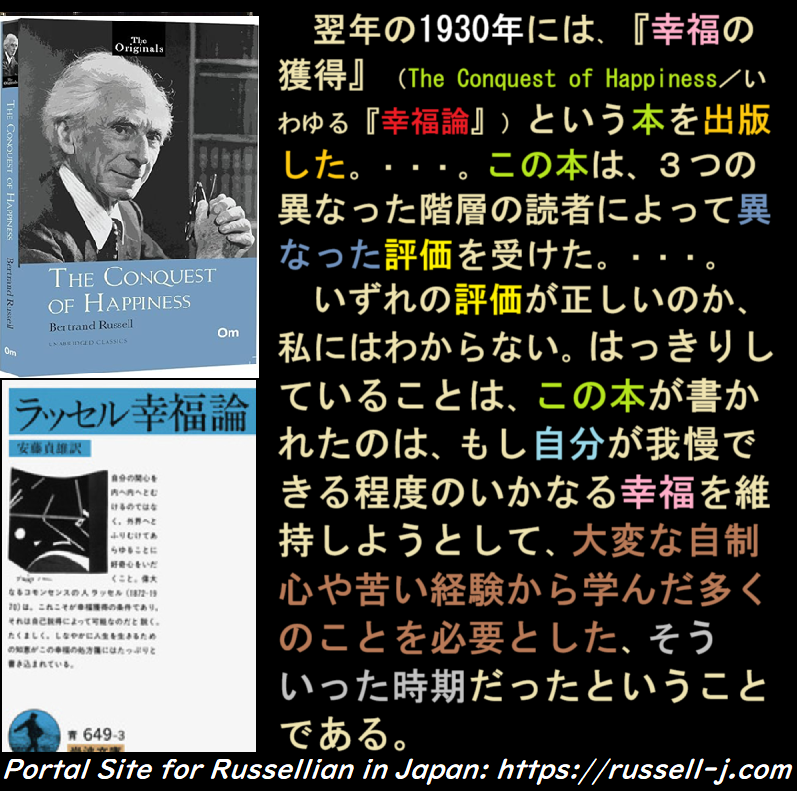
 ラッセル関係電子書籍一覧 |
翌年の1930年には、『幸福の獲得』(The Conquest of Happiness/いわゆる『幸福論』)という本を出版した。・・・この本は,3つの異なった階層の読者によって異なった評価を受けた。・・・
いずれの評価が正しいのか,私にはわからない。はっきりしていることは、この本が書かれたのは、もし自分が我慢できる程度のいかなる幸福を維持しようとして、,大変な自制心や苦い経験から学んだ多くのことを必要とした、そういった時期だったということである。
In the following year, 1930, I published The Conquest of Happiness,... This book was differently estimated by readers of three different levels. ... I do not know which estimate was right; what I do know is that the book was written at a time when I needed much self-command and much that I had learned by painful experience if I was to maintain any endurable level of happiness.
Source: The Autobiography of Bertrand Russell, v.2, chap.3: China
More info.: https://russell-j.com/beginner/AB24-100.HTM
<寸言>
予告通り、「バートランド・ラッセルの言葉366(Bertrand Russell Quotes 366)」は本日の投稿(更新)で終了し、今後は代わりに「バートランド・ラッセルの言葉 - 折々版(Bertrand Russsell Quotes - ocasional edition)」を不定期に投稿していくことにします。年齢を重ねるにつれ、質を保ちながら毎日投稿し続けることが困難となってきたたため、健康のことも考えて、投稿頻度を減らすことにしました。長い間おつきあいいただき、ありがとうございました。
さて、本日の投稿は、ラッセルの『幸福論』からの引用です。原書のタイトルは The Conquest of Happiness (『直訳すれば『幸福の獲得』)で、この書名には、幸福は棚からぼた餅のように待つものではなく、自ら努力してつかみとるものだ、という意味がこめられています。
ラッセル自身、次のように述べています。(The Autobiography of Bertrand Russell』v.2, chapter 6)
「この本が書かれたのは、もし自分が我慢できる程度のいかなる幸福を維持しようとしても、大変な自制心や苦い経験から学んだ多くのことを必要とした、そういった時期だったということである。(What I do know is that the book was written at a time when I needed much self-command and much that I had learned by painful experience if I was to maintain any endurable level of happiness.”)」当時のラッセルは、妻ドーラ(再婚相手)との関係に大きな影響を受けていました。彼女に婚外子がいたことがその背景にあり、当時の英国では、婚外子であっても離婚していなければ、夫婦の正式な子として扱われる仕組みになっていたようです。
約100年前に出版されたラッセルの『幸福論』は、現在でも世界中で読み継がれています。日本でもこれまでに7種類の翻訳が刊行され、一番新しい岩波文庫版(安藤貞雄訳}も45刷を超えています。 私の翻訳及びコメントとあわせて、ぜひ安藤先生の訳も手に取ってみてください。
* a brief commnet:
As previously announced, today marks the final post of Bertrand Russell Quotes 366. From now on, it will be replaced by Bertrand Russell Quotes - Occasional Edition, which will appear from time to time rather than on a daily basis. As I have grown older, it has become increasingly difficult to maintain the same quality while posting every day, and for the sake of my health, I have decided to reduce the frequency. Thank you very much for following along for so long.
Today's post is a quotation from Russell's The Conquest of Happiness (literally , a title which conveys the idea that happiness is not something to be passively awaited, like a windfall, but something to be actively won through effort.
Russell himself wrote the following (The Autobiography of Bertrand Russell, Vol. 2, Chapter 6):
"What I do know is that the book was written at a time when I needed much self-command and much that I had learned by painful experience if I was to maintain any endurable level of happiness."At that time, Russell was deeply affected by his relationship with his second wife, Dora. One factor behind this was that she had children by another man, and under English law at the time, such children were legally regarded as the husband's unless the couple had divorced.
Published nearly a hundred years ago, The Conquest of Happiness continues to be read worldwide. In Japan, seven different translations have appeared so far, with the most recent Iwanami Bunko edition (translated by Sadao Ando) having gone through more than forty-five printings. I hope you will read Professor Ando's translation as well, together with my own translations and comments.
 ラッセル関係電子書籍一覧
ラッセル関係電子書籍一覧
#バートランド・ラッセル #Bertrand_Russell